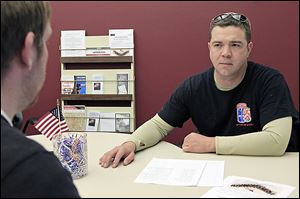
Ohio colleges expand services for veterans
1-stop centers offer support for transition
11/23/2012CINCINNATI — Army veteran Buck Clay found that adjusting to college life after years in the military wasn’t easy.
That’s why he welcomes efforts by Ohio universities and colleges to provide more help for student veterans trying to make that transition.
As more service personnel return from overseas, some campuses are developing one-stop veteran services centers and other ways to better support thousands of veterans around Ohio who are seeking degrees.
“A lot of veterans who get discouraged trying to adapt to a campus environment from the more regimented military culture just give up,” said Mr. Clay, a 31-year-old former Army staff sergeant who served in Iraq and Kosovo. “We need a sense of community and support to help with the academic and emotional challenges.”
Mr. Clay attends the University of Cincinnati, which opened its veterans one-stop center this month. The center will provide more centralized information and access to services such as tutoring, academic and psychological counseling, disability services, and career development.
It also helps students with the approval process required to ensure they are taking the necessary number and types of courses and are eligible for the military benefits.
The increase in student vets has been tied to the large numbers of returning service personnel and to the post-9/11 GI Bill. The 2008 legislation expanded benefits for tuition and other educational expenses for veterans, their dependents, and active military personnel.
As of early November, more than 470,000 individuals nationwide were enrolled in educational programs using those benefits and more than 22,000 in Ohio used them in 2011, the U.S. Department of Veterans Affairs says.
UC students benefiting from the GI bill have doubled to more than 1,000 from about 500 in 2008, and the school believes its center will make veterans “feel like they are now getting complete wraparound services,” said Debra Merchant, associate vice president of student services.
UC is also trying to develop a co-ed veterans group so veterans can network with others sharing similar experiences and goals, Ms. Merchant said.
Ohio State University recently opened its office of military and veterans services to cater to the needs of more than 2,000 students receiving benefits. That number is an increase from just more than 800 four years ago.
“We worried that our veterans were treated like Ping Pong balls,” going to various sites for support, said Wayne Carlson, Ohio State’s dean of undergraduate education.
The one-stop center helps students get certified for benefits and get counseling and other services to improve their academic success.
Another focus is training faculty and staff to understand the needs of veterans, some of whom may suffer from post-traumatic stress disorder or other problems associated with military service.
Navy veteran Angela King, 26, said the office is a big improvement from two years ago when she started at OSU. “A lot of us are going through multiple transitions — coming off deployment and military life at the same time — and having so many types of services at one spot really helps,” she said.
Ohio State and southwest Ohio’s Wright State University, where about 700 students are enrolled under the GI bill, also offer some veterans-only classes allowing veterans to learn alongside classmates with similar life experiences.
The University of Toledo expanded its veterans services center to a one-stop center last year and has hired a veteran to help coordinate veterans services for more than 600 students.
Haraz Ghanbari of UT is reaching out to off-campus veterans groups and student veterans for suggestions. The effort that has led to free parking and priority class registration for those students.
College support services must be broad-based, veterans around the state stress.
Some schools previously focused on “getting students certified for benefits and getting their tuition, but didn't go much beyond that,” Mr. Clay said.
UT medical student Rob Roether, who served in the Army in Iraq and Afghanistan, favors the additional support but has concerns.
“Universities are adapting to meet the demand, but I worry that some students and schools may just take the tuition money without sitting down to determine if every veteran really needs a four-year degree,” said Mr. Roether, 27.
Former Marine Sgt. Jen Hasenaur, president of UT’s chapter of Student Veterans of America, urged schools to seek veterans’ feedback.
“If they’re not asking those students what they need, then they’re just going to spend a lot of money for something that might not be used,” she said.

Buck Clay, right, a former U.S. Army staff sergeant who served in Iraq and Kosovo, talks with a fellow veteran in the veterans support center at the University of Cincinnati. He said veterans, who can have difficulty making the transition from the regimented military culture to a campus environment, need a sense of community and support.